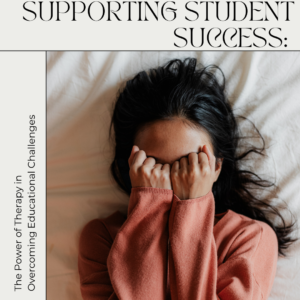Supporting Student Success: The Power of Therapy in Overcoming Educational Challenges
 Higher education is a transformative journey that opens doors to a world of opportunities and personal growth. However, the path to success is not always smooth, and many students face overwhelming challenges that lead them to contemplate dropping out. Surprisingly, recent data from Gallup has shown that a staggering 41% of students enrolled in postsecondary education programs have considered “dropping out” in the past six months. To overcome these hurdles and pave the way for academic success, it is crucial for students to seek support from a mental health professional. This article delves into the importance of therapy for students, highlighting how it can empower them to tackle obstacles and encouraging proactive steps towards a brighter future.
Higher education is a transformative journey that opens doors to a world of opportunities and personal growth. However, the path to success is not always smooth, and many students face overwhelming challenges that lead them to contemplate dropping out. Surprisingly, recent data from Gallup has shown that a staggering 41% of students enrolled in postsecondary education programs have considered “dropping out” in the past six months. To overcome these hurdles and pave the way for academic success, it is crucial for students to seek support from a mental health professional. This article delves into the importance of therapy for students, highlighting how it can empower them to tackle obstacles and encouraging proactive steps towards a brighter future.
The Weight of Academic Pressure:
Postsecondary education can be demanding, leaving students juggling academic responsibilities, extracurricular commitments, financial burdens, and personal challenges. The pressure to excel academically, meet high expectations, and manage various aspects of life can take a toll on mental health, leading to feelings of anxiety, stress, and helplessness. It is no wonder that a significant number of students find themselves contemplating dropping out, as they grapple with these overwhelming emotions.
The Role of Therapy in Student Success:
Therapy offers a safe and confidential space for students to share their concerns, fears, and struggles without judgment. Seeking support from a therapist can be a game-changer, providing students with the tools to navigate the complexities of college life effectively. Here are some ways in which therapy can be of immense help to students:
- Emotional Well-being: Therapy equips students with coping strategies to manage stress, anxiety, and depression effectively. Learning healthy ways to process emotions and handle challenging situations can significantly improve overall well-being.
- Building Resilience: Therapists work with students to build resilience and develop a positive mindset. By cultivating resilience, students can bounce back from setbacks and persevere through difficult times.
- Academic Support: Therapy can assist students in addressing underlying academic challenges such as time management, study skills, and test anxiety. Improved academic performance can alleviate feelings of frustration and boost confidence.
- Developing Self-awareness: Through therapy, students can gain insight into their thoughts, behaviors, and patterns. Increased self-awareness enables them to identify and address issues proactively.
- Enhanced Relationships: College life often involves navigating complex social dynamics. Therapy can help students build healthy relationships, set boundaries, and improve communication skills.
Taking Proactive Steps Towards Success:
The journey towards success starts with acknowledging the need for support. Rather than waiting until academic challenges become overwhelming, students are encouraged to schedule an appointment with a therapist proactively. Here’s how to get started:
- Reach Out: Reach out to the counseling center or health services to inquire about available resources. CARE Counseling for example, a Minnesota Based therapy practice offers same week availability, as well as accepts all major Minnesota insurances, and is a partner with all major Minnesota Colleges, is a great solution for students seeking support.
- Prioritize Self-care: In addition to seeking therapy, prioritize self-care. Maintain a balanced lifestyle by getting enough rest, engaging in physical activity, and nurturing meaningful connections.
In a world that demands constant growth and success, students must recognize the significance of mental well-being in their educational journey. The fact that 41% of students have considered dropping out is a wake-up call to address the mental health challenges faced during postsecondary education. Therapy provides a transformative opportunity for students to conquer obstacles, build resilience, and thrive academically and personally. By seeking support from a therapist and taking proactive steps towards mental well-being, students can unlock their full potential and make the most of their higher education experience. Remember, it’s okay to ask for help, and therapy can be the key to unlocking your path to success.



























